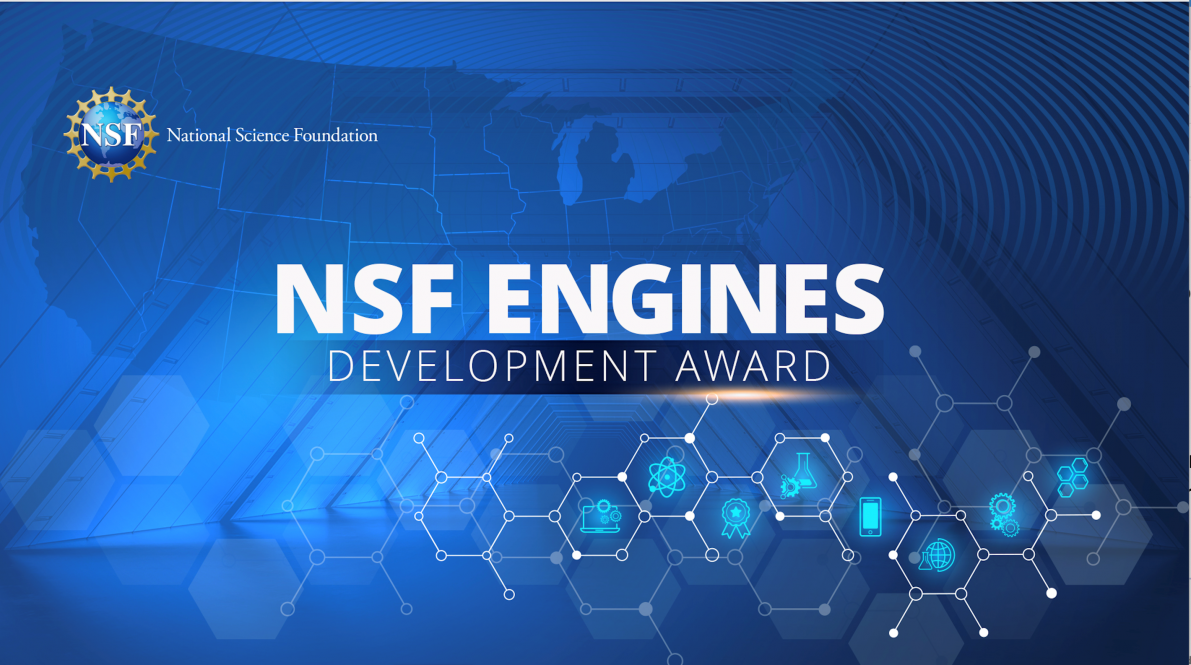Connecticut is making progress to become the nation’s leading accelerator of quantum technologies, with UConn and Yale leading the way.
The state’s two premiere research universities are heading a massive coalition seeking funds to help establish the state as a quantum leader. This week, the project entitled “Quantum-CT” took an important step towards its goal with a $1 million National Science Foundation (NSF) Engines Development award.
NSF Regional Innovations Engines awarded more than 40 of the prestigious, first-ever awards to collaborations formed to create economic, societal, and technological opportunities for their regions.
The UConn-Yale partnership recruited an expansive coalition of public, private, and state officials that aims to establish Connecticut as an innovation engine powered by quantum technologies. The award funds a two-year development effort that will help position Connecticut to become the nation’s accelerator for quantum technologies and compete for an NSF Engines award of up to $160 million over 10 years.
“Quantum science and technologies hold so many keys to the future of Connecticut and the nation,” said Pamir Alpay, UConn’s interim vice president for research, innovation, and entrepreneurship. “Bringing together the expertise and research excellence of UConn, Yale, and many partners, Quantum-CT has the potential to be transformative for science, our economy, and workforce. This program extends opportunities to communities and sectors left behind by recent economic downturn and promotes equitability across the state.”

Alpay is one of the lead investigators on the project. Quantum-CT seeks to make Connecticut the nation’s accelerator for quantum technologies, which is tech developed through quantum mechanical principles that govern the atomic and subatomic world. Quantum technologies are poised to influence hundreds of applications, including smartphones, navigation systems, advanced computers, and hundreds of other applications impacting many of Connecticut’s key manufacturing, energy, and infrastructure industries.
“Connecticut is a microcosm of the challenges and opportunities facing our nation,” said UConn President Radenka Maric. “Our proud industrial base has stayed strong in the face of international competition, offshore manufacturing, and the mass retirement of skilled workers. Likewise, our cities and towns have persevered through tremendous adversity. UConn is honored to join Yale as leaders in the effort to make Connecticut America’s accelerator by transforming a diverse, compact region into an economic development powerhouse using quantum tech.”
With its versatility and potential to change lives for the better, quantum technology research and development has generated dozens of partners for the Quantum-CT initiative. Collaborators on the grant include the Governor’s office, the cities of Hartford, New Haven, Stamford, and Waterbury, the Connecticut State Colleges and Universities (CSCU), the Connecticut Conference of Independent Colleges, and the CT Business and Industry Association, among others. Innovation and venture partners, including Connecticut Innovations, CT Next, Advance CT, Yale Ventures, and UConn’s Technology Innovation Program, will work to together ensure that emerging quantum technologies are quickly transferred to real-world applications.
“Quantum technology represents the future of computers and science, and through a partnership fused between UConn and Yale, Connecticut is ready, determined, and eager to become the nationwide hub and central force of this technological revolution,” Governor Ned Lamont said. “Our workforce in Connecticut is the best educated and most talented in the nation, trained with the modern skills needed to make the United States an international leader in the research and development of the emerging field of quantum technology. Our workforce, our businesses, our schools, our research institutions, and our state government are aligned in the effort to create the pipeline needed to grow this field.”
The NSF designed the awards to benefit states and regions that have not fully benefited from the technology boom of the last few decades. Quantum-CT is officially award number 2302908.
“These NSF Engines Development Awards lay the foundation for emerging hubs of innovation and potential future NSF Engines,” said NSF Director Sethuraman Panchanathan, who visited UConn in 2022 and announced the Engines program. “These awardees are part of the fabric of NSF’s vision to create opportunities everywhere and enable innovation anywhere. They will build robust regional partnerships rooted in scientific and technological innovation in every part of our nation. Through these planning awards, NSF is seeding the future for in-place innovation in communities and to grow their regional economies through research and partnerships. This will unleash ideas, talent, pathways and resources to create vibrant innovation ecosystems all across our nation.”
The Quantum-CT planning initiative is complex, incorporating all sectors that stand to be impacted by the economic revitalization spurred through quantum technology translation. In addition to state offices and the network of universities, technology adopters in the pharmaceutical, defense, financial services, and computing sectors all stand to benefit.
“Yale has a stellar reputation in quantum science and a blossoming start-up community in quantum technologies,” said Michael Crair, Yale’s vice provost for research and co-principal investigator for the NSF grant. “This will be a multi-billion-dollar industry, and we’d love for Yale and UConn, with partners around the state, to nucleate a national quantum corridor in Connecticut.”
UConn’s involvement includes more than a dozen researchers spanning several schools, colleges, and services, including the School of Engineering, College of Liberal Arts and Sciences, and the Technology Commercialization Services wing of the University’s research enterprise. Quantum technology is applicable to many of UConn’s research priorities, including sensing, cryptography, artificial intelligence, infrastructure optimization, drug and therapy development, software, and cybersecurity.
“The complexity and vastness of Quantum-CT will draw out the best of UConn and utilize our full physical infrastructure and intellectual capital,” Alpay said. “Together with Yale and the support of our partners, we have the resources and expertise necessary to make Connecticut the nation’s quantum technology accelerator.”
More information about Quantum-CT is available at quantumct.org. To learn more about the NSF Regional Innovation Engines, visit new.nsf.gov/funding/initiatives/regional-innovation-engines.



